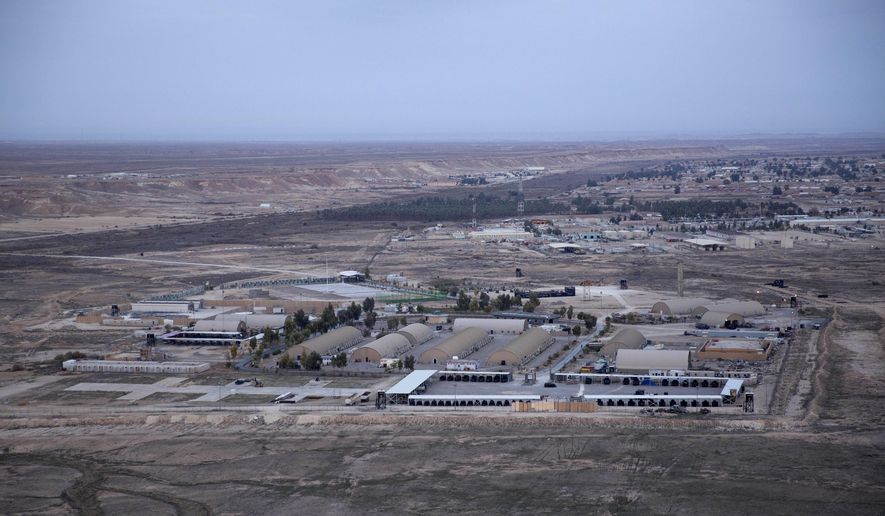A fresh barrage of rockets hit an Iraqi base housing U.S. and allied troops in western Iraq Wednesday, prompting a fresh warning from the Biden administration it was prepared to respond in kind as it did to a similar incident last month.
A burst of at least 10 rockets targeting the Ain al-Asad airbase early Wednesday resulted in no direct U.S. troop casualties, but the Pentagon later revealed that an American contractor working with the base had suffered a “cardiac episode” and died while taking cover from the attack.
“All U.S. personnel are accounted for,” chief Pentagon spokesman John Kirby told reporters afterwards. The base also houses troops from Britain and Denmark helping to train Iraqi forces.
U.S. officials have blamed past attacks on Iraqi positions on Shiite militias with close ties to Iran.
The base’s missile defense system — known as C-RAM for Counter-rocket, artillery and mortar — engaged the rockets during the strike. It wasn’t immediately known how successful the C-RAM was.
The Pentagon believes the attack came from more than one location, exhibiting a level of experience with relatively sophisticated weapons such as the Iran-built 122mm Arash rockets.
Iraqi security officials quickly located the sites and are continuing to investigate. An Iraqi military official later told The Associated Press that the rockets were fired from the al-Baghdadi area of Iraq’s Anbar province.
“We stand by as needed to assist our Iraqi partners as they investigate,” Mr. Kirby said.
Wednesday’s attack was the first since U.S. forces hit a compound just over the Syrian border from Iraq last week that killed one fighter and injured two others. U.S. officials on Wednesday said they couldn’t definitively point the finger at Tehran at this point but said the attack “coincides with our past experience.”
“We’re identifying who’s responsible and will make judgments from that point,” Mr. Biden said to reporters at an Oval Office event Wednesday afternoon.
The attack at Ain al-Asad airbase was the first since an Iran-backed militia member was killed last week in an U.S. strike at a compound on the Syria-Iraq border. The mission preceded a string of rocket attacks in the region believed to have been orchestrated by Iran or its proxies.
“This is a problem that has bedeviled us for a while — these militia groups and their ties to Iran,” Mr. Kirby said.
Iran’s Islamic Revolutionary Guard Corps targeted the Ain al-Asad airbase in January 2020 in a missile strike that damaged several buildings. Although U.S. forces there received early warning and took cover, dozens of troops were injured, suffering concussions in the strike.
That attack came in apparent retaliation for a U.S. air strike ordered by President Trump that killed top Iranian Gen. Qassem Soleimani and a leading Iraqi militia leader.
“Nobody wants to see the situation escalate,” Mr. Kirby said. “That’s not in our interest and not in the Iraqi people’s interest.”
The increasing number of attacks from the Iran-backed militia groups and U.S. military responses comes as the Biden administration is seeking to restart diplomatic talks with Tehran aimed at securing a deal to limit Iran’s nuclear program.
So far, Iran has rejected the diplomatic olive branches coming from the White House.
• Mike Glenn can be reached at mglenn@washingtontimes.com.
• Ben Wolfgang can be reached at bwolfgang@washingtontimes.com.




Please read our comment policy before commenting.